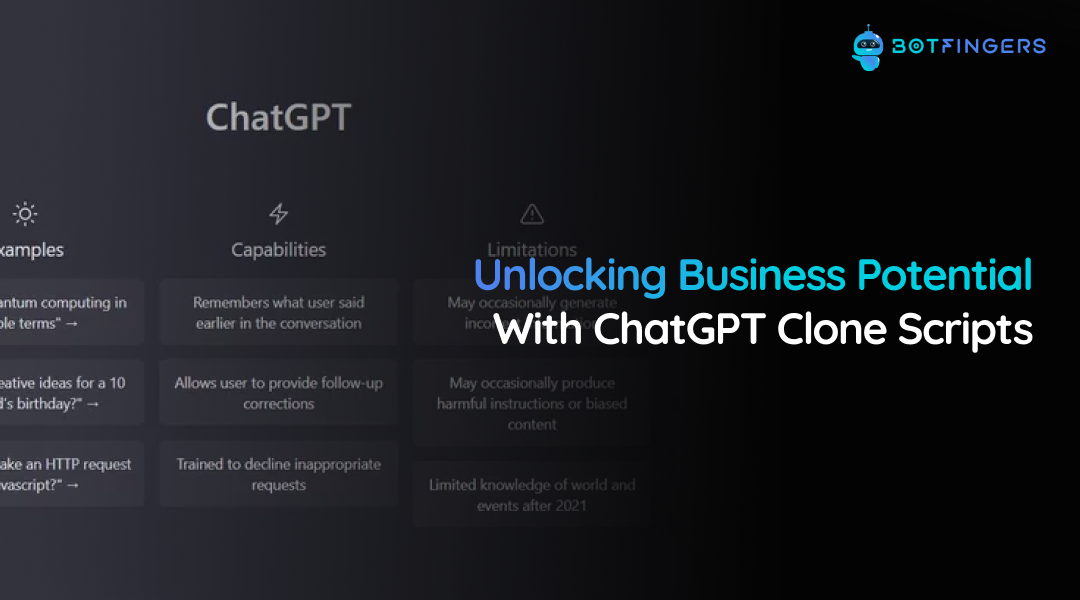In today’s digital age, businesses are constantly seeking innovative ways to engage with their customers, streamline operations, and stay ahead of the competition. Artificial Intelligence (AI) and chatbots have emerged as powerful tools in achieving these goals. One of the most intriguing developments in this space is the availability of ChatGPT clone scripts, which allow businesses to create custom AI chatbots tailored to their specific needs.
How to Build a ChatGPT Clone
Building a ChatGPT clone might seem like a complex endeavor, but with the right resources and guidance, it can be a game-changer for your business. Here are the essential steps to get started:
Choose a Reliable Clone Script.
The foundation of your ChatGPT clone lies in selecting the right clone script. A reputable source, such as ChatGPT Clone, can provide you with the necessary software to kickstart your project.
Customize for Your Brand.
One of the major advantages of using a clone script is the ability to customize the chatbot to align with your brand identity. Tailor the chatbot’s appearance, voice, and personality to resonate with your target audience.
Integrate with Your Platform.
Seamlessly integrate your ChatGPT clone with your website, app, or preferred communication channels. This ensures that customers can interact with your chatbot wherever they engage with your brand.
Training and Data Input.
To make your chatbot truly effective, provide it with a wealth of data related to your business. This might include FAQs, product information, and historical customer interactions. A clone script like ChatGPT Clone Script allows for custom data training, enabling your chatbot to offer more accurate and relevant responses.
Continuous Improvement.
The beauty of a ChatGPT clone is that it can learn and improve over time. Regularly monitor its performance, gather feedback from users, and make adjustments to enhance its capabilities.
Can ChatGPT Be Cloned?
You might wonder if it’s ethical or even legal to clone a technology like ChatGPT. OpenAI, the creator of ChatGPT, has open-sourced its GPT models, allowing developers to build upon them. However, it’s crucial to use such technology responsibly and in compliance with copyright and licensing regulations. When you obtain a clone script from a reputable source, you can be more confident in its legality and ethical use.
Setting Up a ChatGPT Clone with Custom Data Training
Custom data training is a key feature that distinguishes ChatGPT clones from their original counterparts. This functionality empowers businesses to train their chatbots on specific data sets, making them highly relevant to their industry or niche. Here’s how you can set up custom data training:
Data Collection.
Begin by gathering relevant data, including customer inquiries, product information, and industry-specific knowledge. The more data you have, the better your chatbot’s responses will be.
Data Preprocessing.
Clean and structure your data to ensure it’s in a format that the chatbot can understand. This step is crucial for effective training.
Training Configuration.
Use the clone script’s training tools to input your data and configure the chatbot’s learning parameters. This will enable it to understand and respond to user queries accurately.
Testing and Fine-Tuning.
After the initial training, test your chatbot extensively. Identify areas where it can improve and fine-tune its responses accordingly.
In conclusion,
ChatGPT clone scripts offer a promising avenue for businesses to harness the power of AI chatbots. By following the steps outlined here, you can build a ChatGPT clone that not only enhances customer interactions but also contributes to your brand’s growth and success.
Stay tuned for more insights on maximizing the potential of ChatGPT clones in part two of this series.

